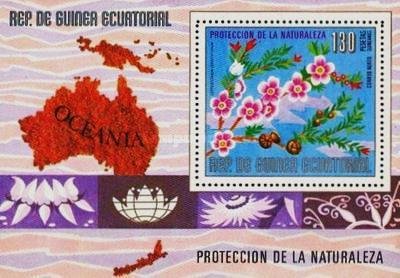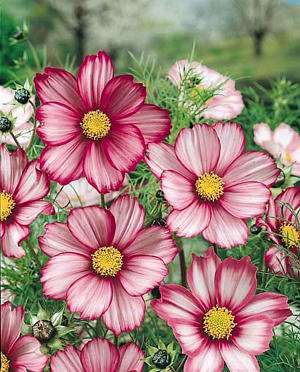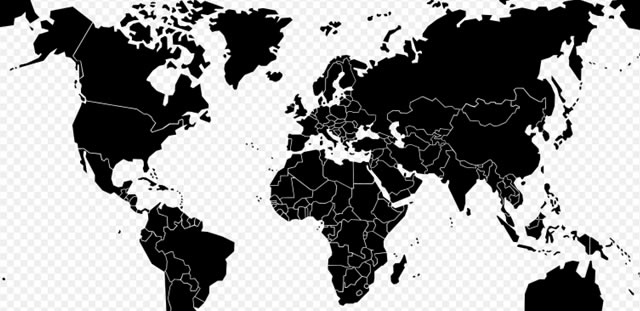Souvenir Sheet: Leptospermum persiciflorum (Equatorial Guinea 1976)
Leptospermum persiciflorum (Equatorial Guinea 1976)
16 August (Equatorial Guinea ) within release Flowers (II) Oceania goes into circulation Souvenir Sheet Leptospermum persiciflorum face value 130 Equatorial Guinean peseta
| Souvenir Sheet Leptospermum persiciflorum in catalogues | |
|---|---|
| Yvert et Tellier: | Yt:GQ 89 (BF3) |
| Stamp Number: | Sn:GQ 76-168 |
| Michel: | Mi:GQ 927 BL234 |
Souvenir Sheet is square format.
Also in the issue Flowers (II) Oceania:
- Souvenir Sheet - Leptospermum persiciflorum face value 130;
- Souvenir Sheet - Patersonia glabrata face value 200;
- Stamp - Patersonia glabrata face value 200;
Souvenir Sheet Leptospermum persiciflorum it reflects the thematic directions:
A flower, sometimes known as a bloom or blossom, is the reproductive structure found in plants that are floral (plants of the division Magnoliophyta, also called angiosperms). The biological function of a flower is to effect reproduction, usually by providing a mechanism for the union of sperm with eggs. Flowers may facilitate outcrossing (fusion of sperm and eggs from different individuals in a population) or allow selfing (fusion of sperm and egg from the same flower). Some flowers produce diaspores without fertilization (parthenocarpy). Flowers contain sporangia and are the site where gametophytes develop. Many flowers have evolved to be attractive to animals, so as to cause them to be vectors for the transfer of pollen. After fertilization, the ovary of the flower develops into fruit containing seeds. In addition to facilitating the reproduction of flowering plants, flowers have long been admired and used by humans to beautify their environment, and also as objects of romance, ritual, religion, medicine and as a source of food.
A map is a symbolic depiction emphasizing relationships between elements of some space, such as objects, regions, or themes. Many maps are static, fixed to paper or some other durable medium, while others are dynamic or interactive. Although most commonly used to depict geography, maps may represent any space, real or imagined, without regard to context or scale, such as in brain mapping, DNA mapping, or computer network topology mapping. The space being mapped may be two dimensional, such as the surface of the earth, three dimensional, such as the interior of the earth, or even more abstract spaces of any dimension, such as arise in modeling phenomena having many independent variables. Although the earliest maps known are of the heavens, geographic maps of territory have a very long tradition and exist from ancient times. The word "map" comes from the medieval Latin Mappa mundi, wherein mappa meant napkin or cloth and mundi the world. Thus, "map" became the shortened term referring to a two-dimensional representation of the surface of the world.
Flora is the plant life occurring in a particular region or time, generally the naturally occurring or indigenous—native plant life. The corresponding term for animal life is fauna. Flora, fauna and other forms of life such as fungi are collectively referred to as biota. Sometimes bacteria and fungi are also referred to as flora, as in the terms gut flora or skin flora.



